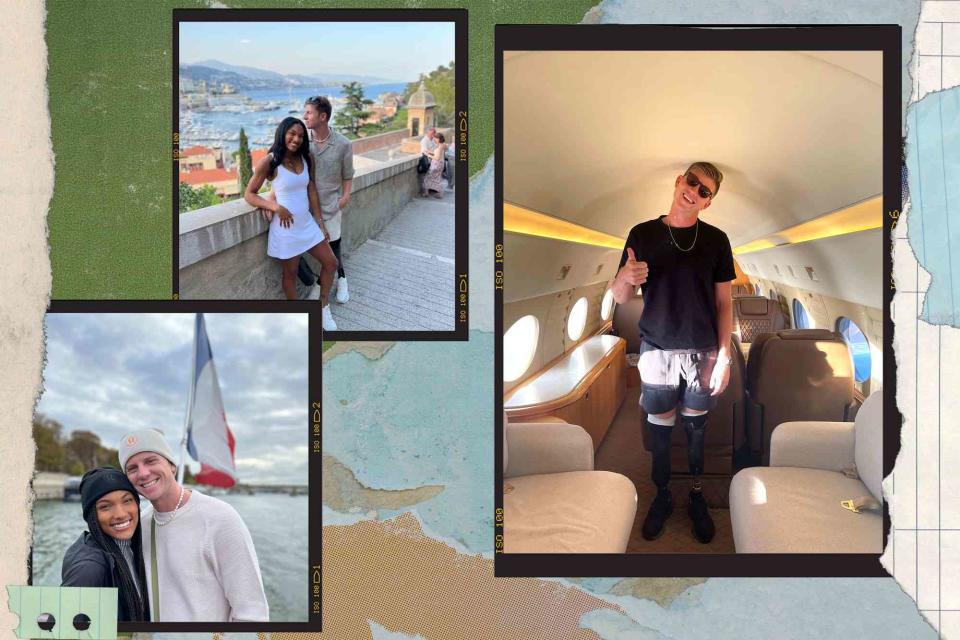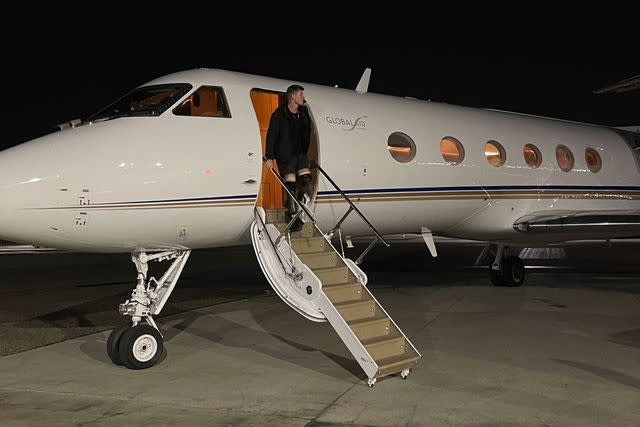I'm a Double Amputee Paralympian With Prosthetic Legs — Here's What It's Like to Travel the World
- Oops!Something went wrong.Please try again later.
Paralympic track-and-field star and Lululemon ambassador Hunter Woodhall shares what his global travels are like wearing two prosthetic legs.

Courtesy of Hunter Woodhall
For Travel + Leisure’s column Traveling As, we’re talking to travelers about what it’s like to explore the world through their unique perspectives. To kick off the series, we chatted with three-time track-and-field Paralympic medalist Hunter Woodhall, who is also a global ambassador for Lululemon, about his experiences traveling as a double amputee with prosthetic legs. Here’s his story…
When I was born, I had a congenital birth defect called fibular hemimelia. I still had my feet, but the fibula in both of my legs was not there. My ankle was also fused on my right leg, so there was no movement. And I had nine toes.
For the first six months of my life, specialists were focused on corrective measures that just weren’t working. The best case scenario would have been that I had to use a walker or assistive walking device. When I was about 10 months old, we found Shriners Hospital for Children, who were the first to suggest an amputation.
The idea was still pretty new for my disability at the time, but my parents had a great support system and made the decision to have both of my legs amputated. That was when I was 11 months old, and six months later, I was on prosthetics and learning how to walk like other kids my age.

Courtesy of Hunter Woodhall
I always understood there was something different about me — I mean, I had to put on my legs every morning. But I have two older brothers, and I followed in their footsteps, doing things they did, including sports. Sometimes, they would make fun of me, as older brothers do, telling me I was disabled, and I would say, “I’m not disabled. There’s nothing wrong with me.”
My dad was in the Air Force, so we moved around a lot, and I was homeschooled until fifth grade. It wasn’t until I went to public school that I realized I was disabled. Still, it wasn’t something I let affect my day-to-day life. I really credit my parents and brothers for never letting me use it as an excuse and pushing me to do everyday things like ride a bike. My mom would always say, “It's not that you can't do something; you just have to find a different way to do it.”
We didn't have enough money to go on family trips. We lived in Georgia, so we would go to Walt Disney World, but I was too young to remember. The only other trip I recall was to Vancouver for the Winter Paralympic Games. My parents wanted to show me what's possible and out there. It worked — I started running track, and before I knew it, I was traveling for meets.
My first big trip was in 2015, when I went to Doha, Qatar, for the world championships. Then, I went to Brazil for the Paralympics, and it was eye-opening. I realized this world is a big place and there are so many cultures you don’t get to know about until you go and experience them. It opened up a new part of me, and I was like, man, I want to see the world.

Courtesy of Hunter Woodhall
Soon, track and field also took me to Brazil, Germany, and London. Then, I met [my now wife, track-and-field Olympian] Tara [Davis-Woodhall] and our travels sped up. We pretty much travel together all the time.
Most of our trips are for work, but we took a personal trip to Cabo, which was incredible — it’s actually where we got engaged. Sure, when we're at beach destinations, there are things I probably shouldn’t do, like go in the saltwater with my prosthetics, but I just love experiencing things, so I try not to let my disability get in the way.
For example, for the longest time, I hated water parks because my mom would make me take my legs off since she didn't want me to ruin my prosthetics. But that meant I had to climb the stairs to the big waterslide on my hands and knees. It was as bad as it sounds. But when Tara and I started dating, she was like, just wear your legs. So, I was sprinting up the stairs, and now, I have a real affinity for water parks.
Amusement parks are different. I’ve been turned away three separate times for wearing shorts. Once, there was no signage and I waited two hours, and when I got to the front of the line, they said I wasn’t allowed to go on, not even with my prosthetics off. It wasn’t even a ride where it would have been a problem.
Simple things like going through the TSA take more time. Every place is different, but Tara and I have gotten it down to a science. I’ll go first since I have to walk through the big detector that spins around you. Then, I get my hands, feet, the entrances to my prosthetics, and my prosthetics all swabbed. They use the metal detector wand on it. Sometimes, they’ll pat me down, but it’s usually an additional five to 10 minutes.
While I’m doing that, Tara will put my laptop and other things in my backpack so we can move on, but it’s a lot. One time, one of the swabs was positive and they brought us to a back room to run more tests and swab all of my bags. It was another 40 minutes before they finally cleared me. But they didn’t give me any insight on what was going on — it was stressful.
I also always have problems with prosthetic tools. I have to travel with a certain set of tools in case anything goes wrong, especially with my running prosthetics, bolts, or track spikes. I follow the rules — for instance, I only carry a wrench that’s a certain length. But they give me the hardest time and have probably taken my tools a dozen times.

Courtesy of Hunter Woodhall
Plane rides can be challenging, too. I’m really tall, so if I'm sitting in economy or basic economy, it’s hard because it puts my knees in an uncomfortable spot. So, I'll often take off my prosthetic and put it under the seat. But I’ll try to wear long pants so it’s not obvious like, “Hey, that dude’s got his legs off!”
I don’t know the exact science, but when I travel internationally, I swell up a bit after I land. So, if I’ve taken off my legs, sometimes I can’t get them back into the prosthetic since they're swollen, even if I’ve worn a compression sleeve. I’ll end up hobbling off the plane with them halfway on. Then, I sit outside the gate until my leg isn’t as swollen. For the first two or so hours, it’ll be uncomfortable and then takes about 24 hours to be totally fine again.
When we're traveling, people will sometimes stare. We're a couple that has a lot going on, so people are probably going to stare for one reason or the next. If we’re in a hot place, where I’m wearing shorts, we get even more stares. Often it comes from kids. Obviously, they're curious and trying to figure out the world. Tara will make funny faces at them. We always get a kick out of that.
The attention doesn't really get to me. I like to have the smoothest day I possibly can and there are plenty of other things that can go wrong when I'm traveling, so I’d rather not let that bother me. It’s a decision that makes my life easier. It's more of a shock to Tara than me because I've been dealing with it my whole life, so I don't worry about it. She's like, "Those people are staring at you!"
But when it comes down to it, I appreciate I'm unique and that I’m giving somebody something to look at.
Related: How Disney World Helped Me Find Joy in My Disability
For more Travel & Leisure news, make sure to sign up for our newsletter!
Read the original article on Travel & Leisure.

